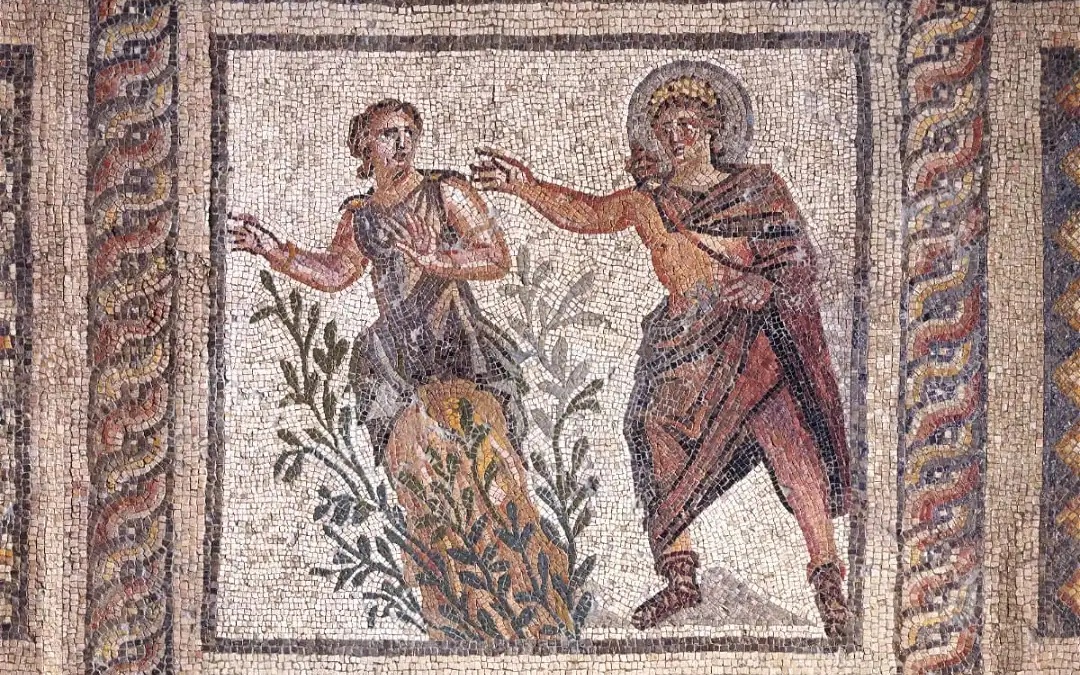Forster is the first to add a picnic to the story of “Daphne and Apollo,” the best-known version of which is Ovid’s Metamorphosis.
When Harcourt Worters gives his wife Evelyn Beaumont a grove of beech trees as a wedding present, she calls it her “picnic grove.” A picnic in the grove is happy; “The young hostess sprang up. She would let none of us help her: it was her party. She undid the basket and emptied out the biscuits and oranges from their bags, and boiled the kettle and poured out the tea, which was horrible. But we laughed and talked with the frivolity that suits the open air, and even Mrs. Worters expectorated her flies with a smile. Over us all there stood the silent, chivalrous figure of Ford, drinking tea carefully lest it should disturb his outline. His guardian, who is a wag, chaffed him and tickled his ankles and calves.
“Well, this is nice!” said Miss Beaumont. “I am happy.”
Worters turns sour because Evelyn has begun an affair with the tutor Mr. Ford. As relations get nasty, Evelyn wanders into the grove and transforms into a beech tree
When Harcourt Worters gives his wife Evelyn Beaumont a grove of beech trees, Other Kingdom Copse, as a wedding present, she calls it her “picnic grove.” A picnic in the grove is happy; “The young hostess sprang up. She would let none of us help her: it was her party. She undid the basket and emptied out the biscuits and oranges from their bags, and boiled the kettle and poured out the tea, which was horrible. But we laughed and talked with the frivolity that suits the open air, and even Mrs. Worters expectorated her flies with a smile. Over us all there stood the silent, chivalrous figure of Ford, drinking tea carefully lest it should disturb his outline. His guardian, who is a wag, chaffed him and tickled his ankles and calves.
“Well, this is nice!” said Miss Beaumont. “I am happy.”
By turns, Worters sours because Evelyn has begun an affair with the tutor Mr. Ford. As relations get nasty, Evelyn wanders into the grove and transforms into a beech tree. “She danced to the song of a bird that sang passionately in Other Kingdom, and the river held back its waves to watch her (one might have supposed), and the winds lay spell-bound in their cavern, and the great clouds spell-bound in the sky. She danced away from our society and our life, back, back through the centuries till houses and fences fell and the earth lay wild to the sun. Her garment was as foliage upon her, the strength of her limbs as boughs, her throat the smooth upper branch that salutes the morning or glistens to the rain. Leaves move, leaves hide it as hers was hidden by the motion of her hair. Leaves move again and it is ours, as her throat was ours again when, parting the tangle, she faced us crying, “Oh!” crying, “Oh Harcourt! I never was so happy. I have all that there is in the world.”
Featured Image: Roman Mosaic. (late 3rd Century CE). Princeton
See E.M. Forster. “The Other Kingdom” (1909), in The Celestial Omnibus, 1911; Frederick Williams. “Daphne Transformed: Parthenius, Ovid, and E.M. Forster.” Hermathena, no. 166 (1999)

